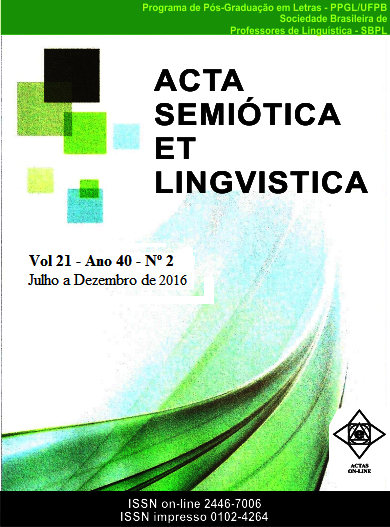O ACONTECIMENTO E O MAL EM O BARRIL DE AMONTILLADO, DE EDGAR ALLAN POE -EVENT AND EVIL IN “THE CASK OF AMONTILLADO” BY EDGAR ALLAN POE
Resumo
Resumo - O artigo investiga a assunção do mal no conto de terror O barril de amontillado de Edgar Allan Poe. Justifica-se este trabalho pelo fato de que os estudos das relações entre literatura e mal ocorrem principalmente no âmbito da Filosofia, em particular nos estudos de Georges Bataille. Embora a Semiótica não se confunda com Filosofia, ela dispõe de aparato teórico metodológico para investigar as relações entre a literatura e o mal, especialmente se adotarmos uma perspectiva com base na enunciação, como propõem pesquisas mais recentes, ligadas à modalidade tensiva. Adota-se, como hipótese de trabalho, que os efeitos de sentido de terror e de suspense do conto estão relacionados ao sobrevir do mal. A junção do sujeito apassivado e objeto-mal decorre de uma sintaxe concessiva, o que origina os efeitos de sentido de assombro. Embora, para o enunciador e para o enunciatário-leitor, o final do conto possa ser da ordem do fato, decorrente de uma sintaxe implicativa; para o sujeito do sentir, o sentido de seu destino, que .é materialização do mal decorrente de um programa narrativo de vingança, se manifesta pelo sobrevir, portanto da ordem do acontecimento.
Palavras-chave: Semiótica; Literatura; Mal; Acontecimento
Abstract - This paper investigates the assumption of evil in the horror short story “The Cask of Amontillado” by Edgar Allan Poe. The rationale for this work rests on the fact that studies on the relationship between literature and evil are mainly carried out in Philosophy, particularly regarding the works by Georges Bataille. Although Semiotics and Philosophy are distinct areas, the first one has theoretical and methodological tools available to investigate the relationship between literature and evil, especially if an enunciation-based perspective is adopted, as proposed by recent studies on tensive model. The hypothesis adopted herein is that the meaning effects of horror and suspense in the story are related to the occurrence of evil. The combination of the passive subject and the object-evil derives from a concessive syntax, which generates the meaning of frightening effects. Although for the enunciator and the enunciatee (reader), the ending of the story might be of the order of the fact, deriving form an implicative syntax; for the subject of feeling, the meaning of its fate – which is the materialization of evil derived from a narrative program of revenge – is manifested by its occurrence, therefore, it is of the order of the event.
Key-words: Semiotics, Literature, Evil, Event
Downloads
Downloads
Publicado
Edição
Seção
Licença
Declaração de Direito Autoral
Os artigos submetidos a revista Acta Semiotica et Lingvistica estão licenciados conforme CC BY. Para mais informações sobre essa forma de licenciamento, consulte: http://creativecommons.org/licenses/by/4.0
A disponibilização é gratuita na Internet, para que os usuários possam ler, fazer download, copiar, distribuir, imprimir, pesquisar ou referenciar o texto integral dos documentos, processá-los para indexação, utilizá-los como dados de entrada de programas para softwares, ou usá-los para qualquer outro propósito legal, sem barreira financeira, legal ou técnica.
1) Autores mantém os direitos autorais e concedem à revista o direito de primeira publicação, com o trabalho simultaneamente licenciado sob a Licença Creative Commons Attribution que permite o compartilhamento do trabalho com reconhecimento da autoria e publicação inicial nesta revista.
2) Autores têm autorização para assumir contratos adicionais separadamente, para distribuição não-exclusiva da versão do trabalho publicada nesta revista (ex.: publicar em repositório institucional ou como capítulo de livro), com reconhecimento de autoria e publicação inicial nesta revista.
3) Autores têm permissão para publicar e distribuir seu trabalho online (ex.: em repositórios institucionais ou na sua página pessoal) a qualquer ponto antes ou durante o processo editorial, já que isso pode gerar alterações produtivas, bem como aumentar o impacto e a citação do trabalho publicado.


